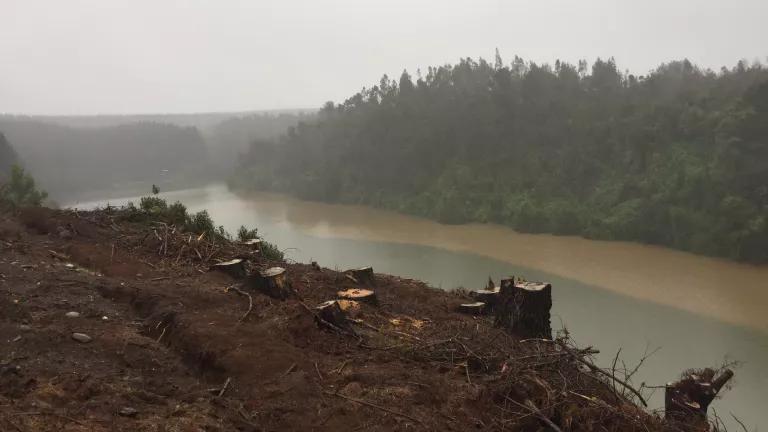The following is the first half of an award-nominated article written by guest author Patricio Segura, journalist and head of the Citizen's Coalition for Aysen's Life Reserve in Chile. The second part will be published tomorrow, Thursday, October 14th. You can read his Spanish blogs on NRDC's Pulso Verde: http://pulsoverde.nrdc.org/psegura/.
The Corporate Social Responsibility Policies of HidroAysén and Energía Austral
CSR or the Price of Wills in Patagonia?
- The complex interference of transnational corporations within the communities and municipalities charged with the environmental impact statements of their projects
The criticism which the Italian-descended bishop of Aysén, Luitino Infanti, leveled in late 2009 against the corporate social responsibility policies of the HidroAysén (controlled by Enel, which seeks to dam the Baker and Pascua rivers) and Energía Austral (property of Xstrata, whose intentions lie in the Cuervo, Blanco and Cóndor rivers) electric companies, came as no surprise. “They cannot serve God and money at once”, he proclaimed to the Catholic community by way of letter, in an ethical reflection on the economic intervention of the hydroelectric companies which seek to build a combined 8 dams and generate 3700 megawatts of power that would be injected into the national grid through 2300 kilometers of towers and high-tension power lines (a project that in and of itself is estimated to cost some US$3.8 billion), all to meet the requirements of the transnational mining industry.
The response was not long in coming. In January of this year, Jesuit priest Felipe Berríos took to the press to criticize the stance of Aysén’s religious leader, signaling a contradiction in millionaire Douglas Tompkins’s support of the Patagonia Sin Represas movement. “Why don’t the bishops speak of that? Instead of attacking a hydroelectric dam, which I truly believe produces little damage to the environment…why do they not attack one of the most profound ecological problems, the concentration of wealth?” the pastor asked.
When Infanti released his pastor letter in 2008, titled “Give us today our daily water”, he installed an ethical-spiritual debate on the end-use of natural resources. His crusade for water, which 5 years ago was seen as utopian, today is a national campaign that played a part in the presidential contest in late 2009.
The high priest has not been alone in this arduous battle. The exponents of Liberation Theology Marcelo Barros and Leonardo Boff, the ex-first lady of France Danielle Mitterrand, Spanish academic and Goldman Prize in Environment winner Pedro Arrojo, as well as European Union water expert and UNESCO Social Sciences Director Ricardo Petrella, have travelled to Patagonia in support of their message. The world is scrutinizing the dams projects in a territory which UNESCO hopes to declare a Natural World Heritage site.
PROFIT OR PHILANTHROPY?
Until now the debate has centered on the environmental and social impacts of the dams and power lines once they have been constructed. Little has been said of the effects of the CSR of these companies on the local communities during the evaluation phase of their initiatives.
Corporate giving has been abundant: donations of school materials with company logos, scholarships, classes, support for community endeavors, donations, trips, seminars, the financing of books on regional identity and history, and the list goes on.
There are those who believe that this is no more than whitewash that should not be accepted or permitted. Therein lies Bishop Infanti’s call to arms.
Others suspect that the idea is to gain people’s loyalty in anticipation of an eventual rejection on behalf of the State. This recalls terrifying images of chainsaw wielding workers from the disputed cellulose firm Celco (which belongs to Forestal Arauco) marching through the streets of Valdivia in 2005 during the conflict over the contamination of the Cruces River. In November 2009, it was learned that this counter-protest was promoted by the same company, when the President of the Federation of Industrial Unions, Patricio Navarrete, denounced that “they forced all contract companies to go to the march, because they said that we were all Arauco and that Arauco was creating all these jobs, that we had a responsibility and an obligation with the company.”
* * * * *
The second half of the article will be published here tomorrow, Thursday, October 14.
See the original report in complete form, with content citations and sources, at this link: http://bit.ly/cZsaDB


